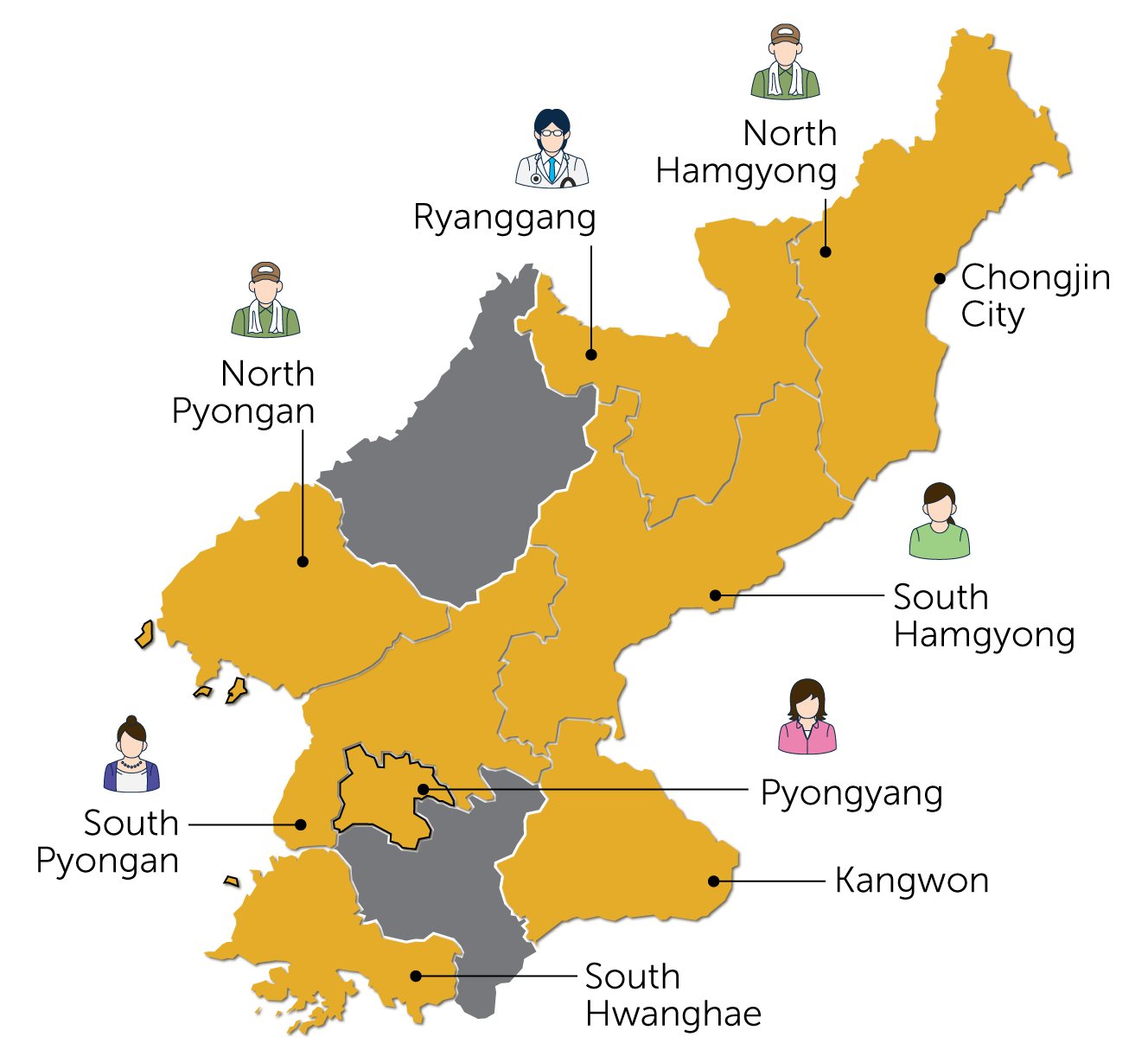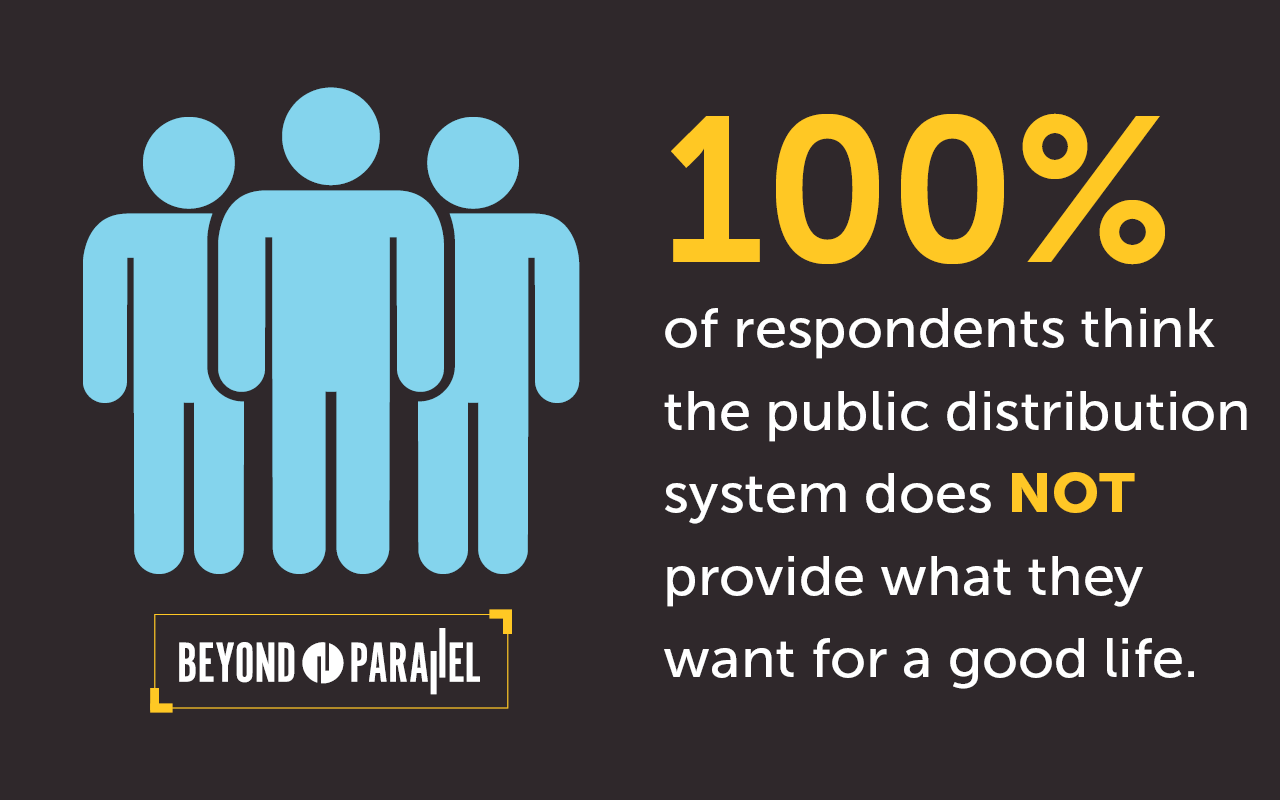
Meager Rations, Banned Markets, and Growing Anger Toward Government
A View Inside North Korea
A Beyond Parallel descriptive survey of North Koreans currently residing in North Korea revealed a clear sense of discontent among respondents about what the government provides its citizens.
Key Findings
- North Koreans know they do not live in a socialist paradise.
- North Koreans no longer rely on the Public Distribution System for sustenance.
- North Koreans express the most animosity toward the government when it undercuts their entrepreneurial activities.
Additional Reading
- The second in our five-part series No Laughing Matter: North Koreans’ Discontent and Daring Jokes.
- The third in our five-part series Information and Its Consequences in North Korea.
- Commentary Samples of Convenience: The Merits of Conducting Surveys Inside North Korea.
- Commentary Dissatisfaction But No Evidence of a Pyongyang Spring.
Conducting the survey itself was significant. North Korea is not a country from which information flows freely or one conducive to vibrant public discourse. In fact, the Beyond Parallel survey is one of the first conducted inside of the highly isolated country. The vast majority of all surveys conducted in recent memory are of North Korean defectors who live in other countries. Beyond Parallel commissioned the survey in eight provinces in North Korea. We talked with men and women in walks of life ranging from laborers, doctors, homemakers, barbers, business presidents, to factory workers spanning in age from 28 to 80.We began by asking North Koreans about the regime’s public distribution system, informal market and bartering activities, outside information, and unification. We inquired about events that drive their view of the government and foreign aid. The first in our five-part series looks at the public distribution system, market and bartering activities, and how these impact North Koreans’ feelings toward the regime.
North Korea Survey: Sample Demographics

The Public Distribution System Does Not Work
The results of the survey are telling. Respondents’ discontent with the regime was evidenced by their very negative responses to the question “Does the public distribution system provide you with what you want for a good life?” Zero of 36 respondents indicated that they currently receive enough through the public distribution system to maintain a good life. One of the 36 people indicated that while the system did provide him with enough in the 1990s, it currently does not.

That North Koreans do not rely fully on the public distribution system is not a new finding. However, the Beyond Parallel survey is the first to confirm this finding from North Koreans living in the country, rather than from defector testimony. A study by Seoul National University (SNU) of North Korean defectors residing in South Korea spanning from 2008 to 2015 found that a significant number relied on market and barter activities. The percentage of defectors reporting such engagement has been on an upward trend since 2008, when just 56.8 percent of 296 respondents indicated engagement in such activities. In 2015, SNU found that percentage had increased to a high watermark of 76.3 percent of 146 respondents.
North Korean Engagement in Market and Bartering Activity
[1] The SNU surveys draw upon a pool of North Korean defectors who have arrived in South Korea during the previous year. Source: North Korean Public Perception on Unification 2015(북한주민 통일의식 2015 ), Institute for Peace and Unification Studies, Seoul National University, 2015, p.110.
North Korean Anger at Government for Anti-Market Activities
Given such significance of market and barter activities, it is not surprising that anger over government predation of market activities and individuals’ entrepreneurial efforts to better their lives was prevalent. Many of the responses to Beyond Parallel’s question about what government activities caused them to feel the greatest animosity toward the regime carried such a theme.
“When the Ministry of People’s Safety/Security took the seed money I had saved to do business 장사 밑천을 보안서에 빼앗겼을 때,” one North Korean replied.

Going to prison for the crime of selling things on the black market.
장사죄로 교화소 가게 됨.
Forced labor mobilization, so-called “non-tax payments,” insufficient wages.
강압적인 노력 동원, 세외(稅外)부담, 노임미달.
Seizure of assets. Being sent to kyohwaso (re-education camps).
재산 몰수. 교화소 수감.
Because no one looks after regular citizens in their daily lives.
일반 서민들의 생활은 누구도 돌보지 않았기 때문입니다.
Suspension of rations, the burden of non-tax payments to the government.
배급 중단과 세외 부담.
Inconveniences in daily life. Electrical outages and breaks in running water.
생활상의 불편 때문. 정전과 수돗물 단절.
Many respondents said currency redenomination 화폐 개혁 caused them to feel the greatest animosity toward the regime. The Korea Institute for National Unification’s (KINU) 2011 Quality of Life in North Korea survey of North Korean defectors living in China found a similar sentiment. One of KINU’s respondents explained, “What had escalated North Koreans’ distrust about the regime even further was the currency reform implemented in November 2009.” Another echoed, “There are so many people out there who got bitter about the country because of the [currency] reform. They say that they got robbed by Kim Jong Il overnight.” Once again, however, Beyond Parallel’s survey confirms that similar views are held among the populace living in North Korea, and not just among the defector community.
From the voices of North Koreans themselves, for the first time, we hear them saying their system does not work for regular citizens. Through reliance on the North Korean system alone, these citizens are not able to achieve their standards for a good life. North Koreans are angered when the regime interferes with the people’s entrepreneurial efforts to improve their lives on their own. 
